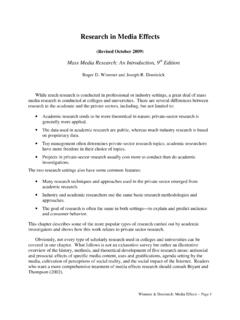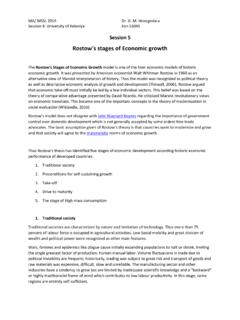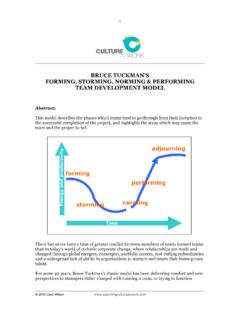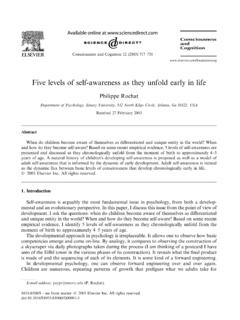Transcription of The Five Stages of Communication - Roger Wimmer
1 Wimmer Communication : 1 The five Stages of Communication /Persuasion Roger Wimmer , Wimmer Research "This discussion is brilliant." - Charles U. Larson, Author of Persuasion: Reception and Responsibility During the past several years I have heard many people ask a variation of the following question: How can I be more successful in what I do? I think that most people would have some type of an answer for this question, but I also think that many would say, I don t know. However, being the person that I am, I started to think about this question. I have heard it as a father, a university professor, and a CEO.
2 Several years ago, I began to wonder if I could come up with an answer that would relate to anyone, regardless of the situation. (Sure, I could ride my Harley or Bourget, go on a vacation, or sell things on eBay, but I wanted to try to answer the question.) INTRODUCTION The first thing I did was to pay close attention to people when they make decisions or when they learn something. What I learned is that most people search for the easiest way to do things. I don t think there is anything wrong with that. In fact, the easiest way to do things or learn things is probably the best approach.
3 But I won t take credit for that idea. Although the idea of simplicity may originate with the first human being, 14th century English philosopher, William of Ockham (also spelled Occam), first publicized it with his idea of Ockham s Razor. Willie, as his friends probably called him, said (paraphrase) The simplest approach is usually the best. (William actually said something closer to: entities should not be multiplied without necessity.) In the quest to find an answer to the question, it seemed logical to follow Ockham s philosophy. It didn t make sense to follow a philosophy of the most complicated approach is usually the best.
4 My initial ideas about an answer to the question led to other thoughts. First, it became evident that it would be helpful to find a universal answer to the question; that is, how to be successful in every facet of life personal, family, friendships, school, and career. This made sense. It didn t make sense to find an answer that would relate to only one situation. One answer that fits all situations makes much more sense (and it s simple). BACKGROUND As I thought about finding one answer, my first question was: Is it possible to have one answer or answer set that would fit all situations?
5 There are two approaches to answering this question. Let s take a look at both sides of the argument. One side would take a pessimistic view and say that there is no single answer (or rule or procedure) that would apply to all situations. These people might say, For every rule there is an exception. Or, There is no way that one answer, one rule, or one procedure can apply to all situations, so why waste time trying to finding it. Oh no, stumped already. I might as well give up. Then there is the optimistic approach the side that does not give up. Well, low and behold, while thinking about this problem For every rule there is an exception I happened to see the Q & A column Wimmer Communication : 2 written by Marilyn vos Savant, the person with the highest recorded IQ in the world (Parade, October 20, 1996, Page 18).
6 In that column (a total coincidence), a man asked: What is the exception to the rule that For every rule there is an exception ? Ms vos Savant s answer was, .. the exception to your rule [for every rule there is an exception] would be a rule with no exceptions. (Italics added). A light bulb went off! This must relate in some way to developing one answer to the question of how to become more successful. Is there a rule without exceptions? Can such a rule be developed? Are there attempts to find such rules? Are there investigations being conducted to search for such simplicity?
7 I found that the answer is yes. One such investigation is by physicists who are searching for what is called a Grand Unified Theory (GUT) to explain the universe and everything in it. These scientists are searching for a rule (actually a formula) that has no exceptions. Now I knew what I was searching for .. a Grand Unified Theory to answer the question. Now, I thought, searching for a GUT in physics is an admirable task, but I don t relate very well to quarks, black holes, and quantum physics. It seems that if I am going to try to develop a GUT for the 'success' question, the focus should relate more closely to home more closely to what we deal with every day.
8 So I read articles and books, I listened to speeches and presentations, I watched people in everyday situations, and I listened to the radio and watched TV. In all those countless hours, I found one thing that is universally common: Communication . We communicate every minute of every day. That has to be the key. The search for a Grand Unified Theory to answer the question had to relate to Communication in one way or another. The importance of Communication seemed to be a more realistic area than searching for the importance of a quark. I just wasn t sure.
9 (What I didn t know then is that I would find more than one Grand Unified Theory.) THE BEGINNING I had to keep in mind that my goal was to develop an answer to the question stated in the first paragraph: How can I become more successful? I kept thinking whether there could be a Grand Unified Theory in communications that would provide people with a pathway to success. Could there be a communications GUT that would address the communications problems we have in every facet of our lives? There had to be. No way is a phrase I don t like to hear. How could I find the answer?
10 I received a hint from Sir Isaac Newton. When asked how he developed the laws of celestial dynamics, Newton said, By thinking about them without ceasing (Ferris, 1988:116). Now, I am NOT comparing myself to Newton, but I did follow his advice. I thought about the problem without ceasing. After about two years, I realized that I was on the right track. The key to developing a GUT to answer the question had to relate to communications. It became clear that the more we know about human Communication , the easier it would be to address the question.










